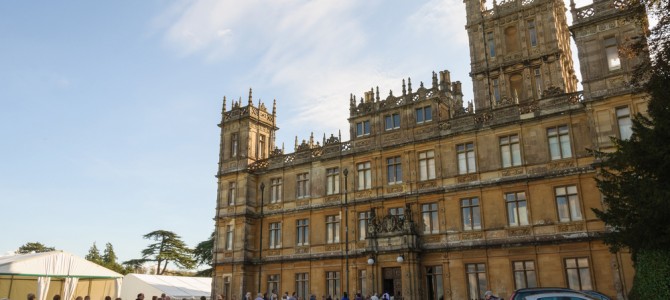
Ah, “Downton Abbey.” The show that inspires watchers all over America to bake some scones and drink Earl Grey tea. The show that makes us wish we could wear those elegant, old-fashioned clothes, or pronounce “schedule” in that funny way.
Many watch “Downton Abbey” and feel as if they’re participating in a reminiscence of “the good old days.” They feel as if they’re joining those dear old-fashioned reactionaries, who bemoan with Lord Crawley (Hugh Bonneville) “the destruction of us and everything we stand for,” championing the noble aristocracy.
But on closer examination, “Downton Abbey” doesn’t really offer us anything historically accurate or genuinely traditional. It’s just a soap opera, dressed in all the trappings of a turn-of-the-century drama: a “Days of Our Lives” episode in which the characters all wear period costumes.
Nothing New Yet in Season Five
Thus far, as Joe Reid, Sophie Gilbert, and Katie Kilkenny point out in The Atlantic, season five’s biggest problem is that it isn’t offering us anything new in the soap opera world. Mary is still trying to decide whether she wants to marry Lord Gillingham or not. Thomas is… well, Thomas: conniving, manipulative, sneering, and incredibly annoying. The Bates’ storyline continues to perpetuate ominous sentiments of gloom, despite the fact that we really wish, at this point, the past would die. Lady Edith is a character I wish I could like more: she shows guts, every so often, and seems to have a real desire to serve and love (some of) the people around her. But she often seems mopey and spineless, making Mary’s icy resolve seem infinitely preferable (even when it, too, is annoying).
Lacking thus far: any sort of relationship between Mary and Branson and their respective children. Both protagonists’ stories focus almost entirely on the prospect of future marriage or romantic love. And though nannies were generally tasked with the care of children in such families, back in the day, it seems odd that the children receive hardly a cursory glance or mention in the first episode, except in the event of a house fire near the end. Instead, we get plenty of Mary’s surmises about the appeal of premarital sex, accompanied with a proposition of just that from Lord Gillingham.
But this is what audiences want, it would seem—as Louis Bayard of the New York Times put it, he is “feeling the need for a little disorder” (and wants Lady Edith to start writing soft lesbian pornography, apparently). The Atlantic writers, too, criticize Lord Crawley’s customary reactionary emotions, and applaud Mary for her daring sexual boldness (or at least what is considered boldness).
Where ‘Downton Abbey’ Shines
There were several storylines in the early series that were excellent, and have been sadly lost to the sands of time: there was the sweet love story between Bates and Anna, Carson’s fatherly relationship with Mary. Downton shines when it focuses on the building of friendships and marriages, like the friendship between Carson and Mrs. Hughes, Mrs. Patmore and Daisy, the Dowager Countess and Mrs. Crawley. The show is even better when it takes on the issue of stewardship and the historical purposes of nobility: there have been episodes in which the owners of Downton (Lord Crawley, Mary, and others) explained the obligation they felt to their community, as well as all those they employed. They described the important duty they had to the community. And all this was a perspective on the aristocracy that is rather unique, one that Americans, especially, are unaccustomed to. Mary excelled when, as she emerged from grief in the last season, she took on the mantle of leadership of the estate with a definitive seriousness and purpose. It was better than all the silly romanticisms of past seasons. It meant something, and showed a maturity of character that differentiated her from past manifestations of herself. But now, sadly, it seems we’re back to the old Mary: interested only in another eligible bachelor on the horizon.
Branson, too, who used to seem to have a renewed sense of purpose in managing the estate, is now back to his old self: restless and without purpose, interested in a woman who seems to promise escape from the estate and all its stuffiness. The old questions of stewardship, vocation, purpose, and friendship are fading more and more, ever increasingly replaced by romantic smarm. Moreover, when creator Julian Fellowes killed off Sybil and Matthew, he lost two of his best characters—and the show may never recover.
But the show has some truly endearing characters: the Dowager Countess, Carson, Mrs. Hughes, Mrs. Patmore, Cora, Anna. We keep watching for them, for their stories. We overlook a lot to enjoy their development as characters. As Moira MacDonald put it in the Seattle Times,
‘Downton Abbey’ has always been a soap opera, but a particularly high-quality one (particularly in Season One, the likes of which we will probably never see again); this season opener, with its too-obvious music cues and predictable plot developments, was a reminder of that. But these characters are irresistible, and I suspect that hearing the Dowager Countess make pronouncements (my favorite from Sunday: ‘Principles are like prayers. Noble, of course, but awkward at a party’) will never get old.
Sarah Seltzer of Flavorwire thinks the “Downton” creators have finally gone too far. The “delicious soapy quality that set Downton apart from other series of its type and made it popular in the first place has now gone around the bend,” she writes, “and wrapped a veneer of staleness around the latter seasons.”
Who is right? Is “Downton” still worth watching, or has it become unbearable? I’m not sure yet—so I’ll watch one more episode, for the Dowager Countess’s sake.









